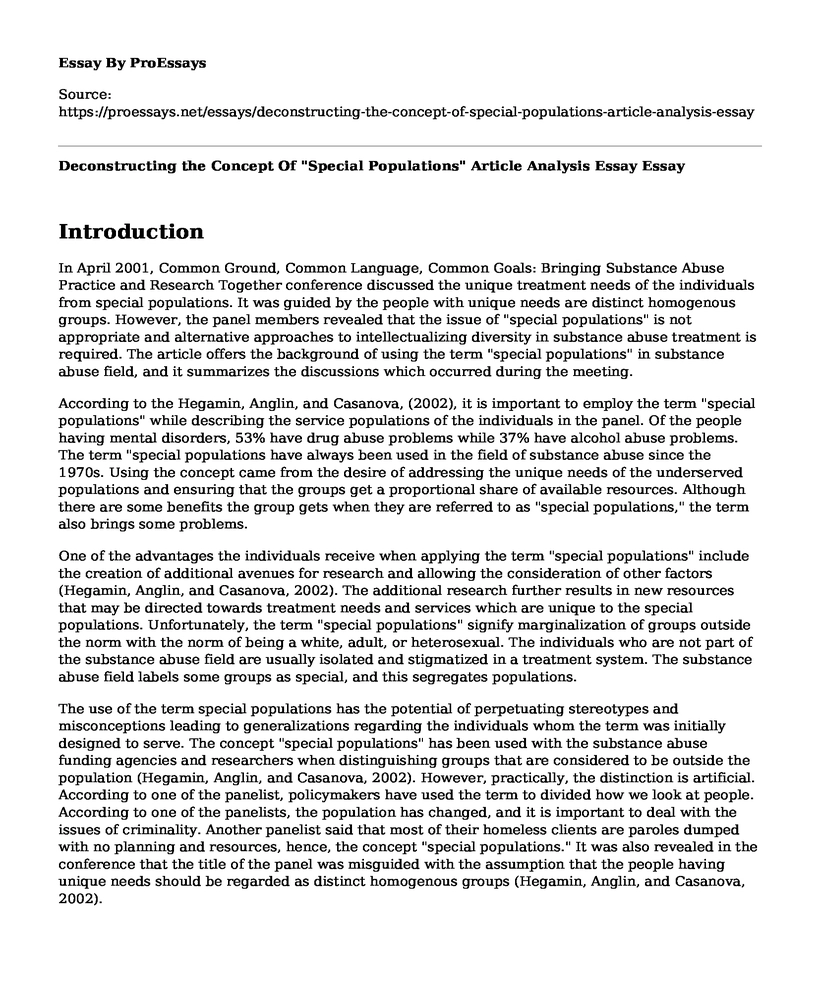Introduction
In April 2001, Common Ground, Common Language, Common Goals: Bringing Substance Abuse Practice and Research Together conference discussed the unique treatment needs of the individuals from special populations. It was guided by the people with unique needs are distinct homogenous groups. However, the panel members revealed that the issue of "special populations" is not appropriate and alternative approaches to intellectualizing diversity in substance abuse treatment is required. The article offers the background of using the term "special populations" in substance abuse field, and it summarizes the discussions which occurred during the meeting.
According to the Hegamin, Anglin, and Casanova, (2002), it is important to employ the term "special populations" while describing the service populations of the individuals in the panel. Of the people having mental disorders, 53% have drug abuse problems while 37% have alcohol abuse problems. The term "special populations have always been used in the field of substance abuse since the 1970s. Using the concept came from the desire of addressing the unique needs of the underserved populations and ensuring that the groups get a proportional share of available resources. Although there are some benefits the group gets when they are referred to as "special populations," the term also brings some problems.
One of the advantages the individuals receive when applying the term "special populations" include the creation of additional avenues for research and allowing the consideration of other factors (Hegamin, Anglin, and Casanova, 2002). The additional research further results in new resources that may be directed towards treatment needs and services which are unique to the special populations. Unfortunately, the term "special populations" signify marginalization of groups outside the norm with the norm of being a white, adult, or heterosexual. The individuals who are not part of the substance abuse field are usually isolated and stigmatized in a treatment system. The substance abuse field labels some groups as special, and this segregates populations.
The use of the term special populations has the potential of perpetuating stereotypes and misconceptions leading to generalizations regarding the individuals whom the term was initially designed to serve. The concept "special populations" has been used with the substance abuse funding agencies and researchers when distinguishing groups that are considered to be outside the population (Hegamin, Anglin, and Casanova, 2002). However, practically, the distinction is artificial. According to one of the panelist, policymakers have used the term to divided how we look at people. According to one of the panelists, the population has changed, and it is important to deal with the issues of criminality. Another panelist said that most of their homeless clients are paroles dumped with no planning and resources, hence, the concept "special populations." It was also revealed in the conference that the title of the panel was misguided with the assumption that the people having unique needs should be regarded as distinct homogenous groups (Hegamin, Anglin, and Casanova, 2002).
Conclusion
The article is essential as it has information regarding substance abuse and diversity. In the general population, some people have been referred to as "special populations." A large part of this population constitutes of people abusing drugs. The article explains why the individuals are referred to as special populations. It also explains the advantages and disadvantages of being referred to as a special population. The article also gives the various views of the article which makes the article unique and special. The reason is that it has the views of the different panelist which helps in making a good conclusion that although the researchers and policymakers have relied on the term "special populations" for over three decades, the usefulness of this approach for facilitation of drug abuse treatment is limited.
Reference
Hegamin, A., Anglin, G. M., & Casanova, M. (2002). Deconstructing the concept of "special populations." Journal of Drug Issues, 32(3), 825-835.
Cite this page
Deconstructing the Concept Of "Special Populations" Article Analysis Essay. (2022, Apr 11). Retrieved from https://proessays.net/essays/deconstructing-the-concept-of-special-populations-article-analysis-essay
If you are the original author of this essay and no longer wish to have it published on the ProEssays website, please click below to request its removal:
- Paper Example on Intersectionality and Oppression
- Paper Example on Terrorism
- Article Analysis Essay on A Drug That Wakes the Near Dead
- Research Paper on 43 Million Immigrants in US: Impact, Fears and Regulation
- Immigrants Struggle: Discrimination, Deportation & Hate Crimes - Essay Sample
- The Economics of Income Inequality: Exploring Different Sources of Income - Essay Sample
- Paper Example on Addressing Homelessness A Social Imperative







